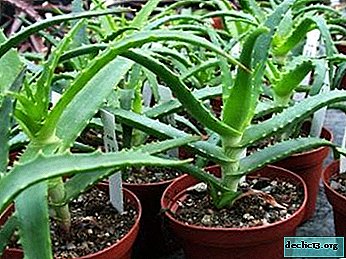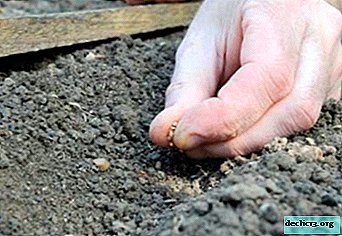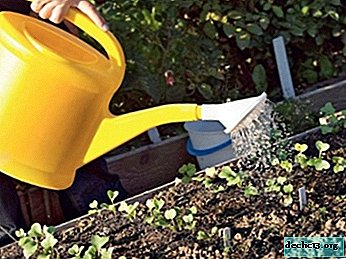Beautiful and fresh bouquet: what can and cannot be added to water so that roses stand longer?

Imagine: after the holiday you bring home a delicious bouquet of roses, and after a couple of days or even in the morning you will be upset. The petals became very soft and lifeless, or even completely fallen, the water exudes an unpleasant smell, the heads bowed, the legs of the roses became dry, like an old tree.
It is important to know what kind of water flowers love, what can and should be added to it, in order to preserve them and roses in a vase stand longer, and how to do it correctly, whether it is possible to put aspirin or sugar, and also what should not be done with plants.
What you need to know in order for a bouquet of roses to please you in a vase as long as possible?
How many flowers can be kept cut?
Depending on the growing and storage conditions, roses can stand from two days to two weeks. The more carefully you follow the rules below, the longer the bouquet will delight you.
How does water affect a plant?
In which water should plants be placed so that they stand longer?
- Since roses love a cool environment, the water for them should not be too warm, otherwise the bouquet will soon fade and lose its pleasant appearance (how to save roses withering in a vase?). Moreover, roses do not tolerate a sharp temperature drop. It is ideal to put flowers in water with a temperature not lower than +11 and not higher than +19 degrees, in a place protected from direct sunlight.
- High temperatures can also contribute to faster proliferation of bacteria in water and its decay.
 Remove the packaging from the roses. Be sure to cut the thorns and leaves off the stem by one third, that is, the part that the water will come into contact with, and cut the stem downward obliquely with a pruner or sharp knife (not scissors!). This will increase the area of water absorption by the plant.
Remove the packaging from the roses. Be sure to cut the thorns and leaves off the stem by one third, that is, the part that the water will come into contact with, and cut the stem downward obliquely with a pruner or sharp knife (not scissors!). This will increase the area of water absorption by the plant.- Before you put the flowers in the water, split the cut so that the water gets there better.
- Do not place roses near batteries. Avoid drafts.
- Be sure to monitor the purity of the water used: it must be filtered. It is advisable to change it every day (in extreme cases - every other day) for a fresh one, washing the stems with running water and updating the ends of the stalks diagonally with the pruner.
- So that the liquid is not oversaturated with oxygen, it should be infused for 12 hours.
- It is also very good to spray roses daily with cool water from a spray bottle.
- Once in a few days, roses need to be lowered completely into the bathtub with cool water for a couple of hours.
- An important role is played by the choice of a vase: it is better to choose a larger and wider one, because even if the process of decay begins, it will go slower. Glass should be opaque. It is advisable to use a vase with a wide neck - this will make air circulation easier.
Thoroughly wash the vase where you want to put the flowers from past bouquets! Roses are very moody!
If you want to give roses the next day, then this method will work:
- prune flowers;
- put them in the water for an hour or two;
- and then refrigerate overnight by wrapping in paper.
Why is it important to add special substances to the water and how can they affect the plant?
Professional florists, in order to preserve the presentation of roses for longer, they use means that are quite affordable in everyday life. Add them to the water and your bouquet will please the eye longer.
What, how to add and why?
What needs to be put in water so that the cut flowers remain fresh for a long time and are preserved in such a solution?
 Sugar and vinegar: 2 teaspoons of granulated sugar and 1 tablespoon of 9% vinegar per 1 liter of water. They are added to nourish and freshness of the roses themselves, inhibit the process of decay.
Sugar and vinegar: 2 teaspoons of granulated sugar and 1 tablespoon of 9% vinegar per 1 liter of water. They are added to nourish and freshness of the roses themselves, inhibit the process of decay.- Alcohol: no more than 1 tablespoon per liter of water. It has a disinfecting effect. In no case do not overdo it in the dosage - otherwise spoil the flowers permanently.
- Aspirin (acetylsalicylic acid): 2 tablets per liter of water. Disinfects water. It has preservative properties. Also retains a vivid look of stems and flowers.
- Lemon acid: 0.2 grams per 1 liter of water. It is better and more convenient to use it in crystals. Can be used instead of vinegar. It has nutritional properties.
- Charcoal: 1-2 tablets per 1 liter of water. It plays the role of absorbent, absorbs harmful substances contained in water, prevents its flowering.
- Boric acid: 1 gram per 1 liter. It has nutritional properties.
- Potassium permanganate (potassium permanganate KMnO4): 1 gram per 1 liter. Not only a disinfectant, but also a micro fertilizer.
- Bleach: 1 drop of liquid 0.5 teaspoon dry to 2-3 liters. Resists the action of putrefactive bacteria, does not rot the stem. Use only for chemically purchased flowers. For those grown on the beds, the bleach is too aggressive.
- Time-tested means for disinfecting and maintaining the freshness of water - silver. Any small silver item will do: coin, spoon, jewelry. Just lower it to the bottom of the vase.
All of these methods are effective, but do not use all of the above substances at once in order to "enhance the effect", it is better to choose one or two, depending on the needs of roses. The application of these rules in compliance with the dosage of substances will help to keep the bouquet longer.
Attention! In flower shops, you can buy ready-made chemical fertilizers for roses. Before use, be sure to dissolve the powder in a small amount of water.You can find more information about the additives with which you can extend the life of roses standing in a vase here.
What is forbidden to flowers?
 Pay attention to what roses in a vase are not compatible with:
Pay attention to what roses in a vase are not compatible with:
- Ethylene. It is formed in fruits when ripe, so keep a vase with a bouquet from them separately.
- Other types of flowers. Roses do not tolerate such a close proximity, as a result, both one and the other flowers will deteriorate. It is better not only not to put them in one vase, but also to arrange vases with different types of flowers further apart.
- Other types of roses. Do not mix different colors and varieties among themselves, even if it seems beautiful to you, this will lead to quick spoilage. Especially quickly and negatively affect each other roses of burgundy and tea flowers. Each color has its own bouquet and its own vase!
- Water inside the bud. It causes rotting, so carefully spray the outside only with water from the spray bottle. Do not allow large drops to flow inside. If you find a rotten flower in a bouquet, then immediately remove it, otherwise rot will spread to the rest of the flowers.
- Any heated object, in addition to batteries, standing close to:
- TV set;
- a computer;
- hair dryer, etc.
As you can see, it is not necessary to be a professional florist to show off a bouquet for a long time. Following these tips, you can enjoy roses for up to two weeks!

 Remove the packaging from the roses. Be sure to cut the thorns and leaves off the stem by one third, that is, the part that the water will come into contact with, and cut the stem downward obliquely with a pruner or sharp knife (not scissors!). This will increase the area of water absorption by the plant.
Remove the packaging from the roses. Be sure to cut the thorns and leaves off the stem by one third, that is, the part that the water will come into contact with, and cut the stem downward obliquely with a pruner or sharp knife (not scissors!). This will increase the area of water absorption by the plant. Sugar and vinegar: 2 teaspoons of granulated sugar and 1 tablespoon of 9% vinegar per 1 liter of water. They are added to nourish and freshness of the roses themselves, inhibit the process of decay.
Sugar and vinegar: 2 teaspoons of granulated sugar and 1 tablespoon of 9% vinegar per 1 liter of water. They are added to nourish and freshness of the roses themselves, inhibit the process of decay.















